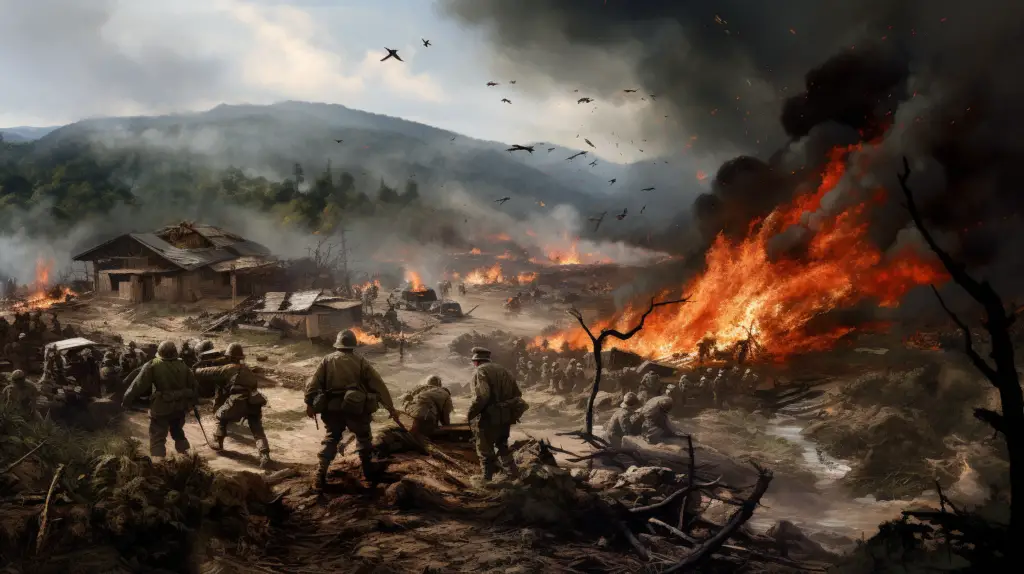The Korean War, colloquially known as ‘The Forgotten War,’ holds an integral place in the annals of 20th-century history. Lasting from 1950 to 1953, this conflict played a pivotal role in shaping the geopolitical landscape of the modern era, setting the stage for the Cold War and the balance of power that would ensue. In many ways, the legacy of the Korean War continues to influence international relations to this day.
However, despite its significance, the Korean War remains shrouded in a veil of complexity, intrigue, and controversy. Here are 25 interesting facts and controversies that elucidate the complex narrative of this three-year conflict:
1. Unexpected Outset: The Korean War began abruptly on June 25, 1950, when North Korean troops, equipped with Soviet tanks, launched a full-scale invasion on South Korea. This invasion was neither anticipated nor immediately countered by the international community.
2. Absence of Formal Declaration of War: Technically, the Korean War wasn’t a “war” in the traditional sense, as neither side ever officially declared war. It was referred to as a “police action” under the auspices of the United Nations.
3. The Role of the United Nations: The Korean War marked the first collective military action taken by the United Nations. Despite the Soviet Union being one of the permanent members of the Security Council, it could not veto this decision due to their ongoing boycott of the UN in protest of Taiwan’s representation as China.
4. The 38th Parallel: The boundary line between North and South Korea, known as the 38th parallel, was a source of continuous dispute. Originally an arbitrary division, it became a heavily militarized border after the war.
5. Significance of the Korean War in the Cold War: The Korean War was a critical event in the early stages of the Cold War. It marked the first time the two superpowers, the US and USSR, confronted each other on the battlefield, albeit through proxies.
6. Involvement of China: The direct involvement of China in the Korean War was a significant turning point. The Chinese intervention in late 1950 pushed the UN forces back, leading to a stalemate.
7. Chemical Weapons Accusations: North Korea and China accused the US of using biological weapons during the war, a highly controversial claim that remains unproven.
8. No Peace Treaty: The Korean War ended with an armistice, not a peace treaty. Technically, North and South Korea are still at war, which is the longest ongoing conflict in modern history.
9. High Casualty Rate: The Korean War had one of the highest casualty rates of any modern war. It is estimated that nearly 5 million people died, a majority of whom were civilians.
10. Civilian Suffering: The War caused tremendous civilian suffering. Instances of human rights abuses and war crimes, committed by both sides, are still being uncovered today.
READ MORE: 25 Interesting and Controversial Facts about Kargil Vijay Diwas
11. Rapid Technological Advancements: The Korean War saw the first extensive use of jet aircraft in combat. It also saw the introduction of medical evacuation by helicopters, a new concept at that time.
12. Controversy over Strategic Bombing: The extensive bombing campaign conducted by the US during the war remains controversial. Some critics have compared it to the scale of destruction caused in WWII.
13. Prisoner of War Controversy: There were several controversies related to prisoners of war. Allegations of brainwashing, forced confessions, and the controversial decision not to repatriate many POWs after the war made headlines.
14. War of Propaganda: The Korean War was also a war of propaganda. Both sides used propaganda extensively to gain domestic and international support.
15. Seoul Exchange: The capital of South Korea, Seoul, changed hands four times during the war, causing immense destruction and displacement.
16. Hill Battles: Many battles during the Korean War were fought over hills. The focus on these seemingly insignificant geographical features had strategic implications, but also led to a high number of casualties.
17. Korean War Impact on Civil Rights Movement: The War had significant domestic implications in the US, particularly on the civil rights movement. The desegregation of the military during the Korean War set a precedent for the broader civil rights movement.
18. Use of Napalm: The Korean War saw the first widespread use of napalm by the US military. This use of incendiary weapons caused significant civilian casualties and remains a controversial topic.
19. Massacres and Atrocities: The War witnessed several massacres and atrocities on both sides. Some of these, like the No Gun Ri Massacre, remain points of contention between the US and South Korea.
20. Turkish Participation: Turkey was the second largest contributor of troops under the UN Command, reflecting the global nature of the conflict.
21. Impact on Korean Society: The War had profound and lasting impacts on Korean society. It intensified national divisions, fueled anti-communist sentiment in the South, and solidified Kim Il-sung’s rule in the North.
22. War Orphans and Adoption: The War resulted in a significant number of Korean orphans, many of whom were adopted by American families. This marked the beginning of international adoptions from Korea.
23. Role of African American Soldiers: African American soldiers played a significant role in the Korean War, serving in integrated units for the first time.
24. Role of Women: While largely overlooked, women served in many capacities during the Korean War. Over 50,000 American women served in various roles, including nursing, communication, and administration.
25. Forgotten War: Despite its significance, the Korean War is often referred to as “The Forgotten War” in the United States due to being overshadowed by World War II and the Vietnam War in the national consciousness.
The Korean War, with its various fascinating and controversial aspects, offers an intricate study of the early Cold War era. It’s a testament to how historical events can have far-reaching impacts, resonating through generations.



